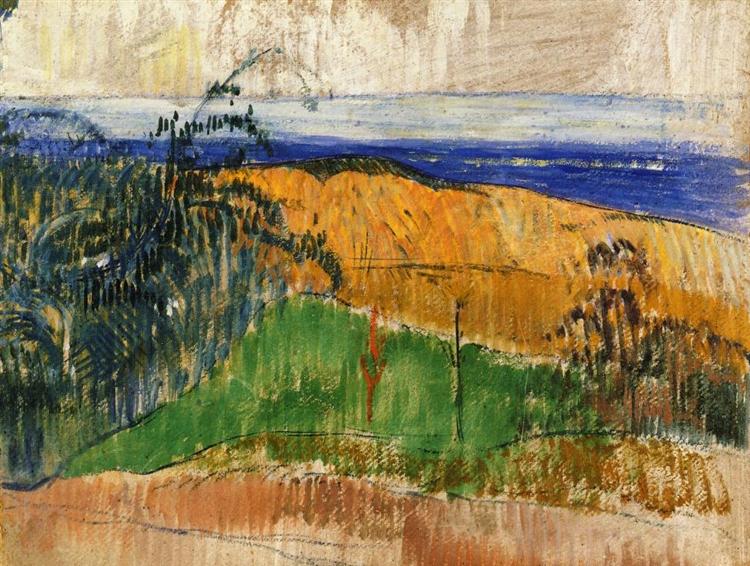Description
The work "Vista of the Beach of Bellangenai" by Paul Gauguin, created in 1889, is erected as a crucial testimony of the transformation of post -impressionist art and the artist's trip towards the use of a bold color and a deep symbolism. This work was developed during the stage of Gauguin's life in Brittany, where he explored not only the natural beauty of the coastal landscape but also the aesthetic and emotional possibilities that this scenario offered.
The composition of the paint is presented with a clear structure that directs the viewer's gaze towards the vast extension of the sea on the horizon. The forms are simplified and combined, providing a sense of order and unification. The horizon line is low, emphasizing the wide space of heaven and the sea, while the coast is presented with a perspective that suggests depth. The waves, painted with loose and curved strokes, reinforce the feeling of movement and the immediacy of the marine landscape.
Gauguin is known for its innovative color use, and in "View of Bellangenai Beach" does not disappoint. The palette is vibrant, dominated by intense blues that evoke the sea and heaven, interspersed with bright green and yellow that describe coastal vegetation. This chromatic approach is not limited to a realistic representation, but seeks to convey a mood and a sensory experience, characteristics of the symbolism that Gauguin cultivated in his work. Intense color contrasts create an almost idyllic atmosphere, raising the vision of the beach to an almost paradisiacal plane.
In the painting, some characters can be seen on the beach. These appear as silhouettes of a darker color than the background, which generates a depth effect and further highlights the vibrant colors of the natural frame. The figures seem to enjoy the calm and serenity of the environment, transforming each form into a symbol of a human experience shared with nature. This use of the human figure in the landscape reflects an interest in the connection between the human being and its environment, a recurring theme in Gauguin's work.
The author, often associated with symbolism and post -impressionism, seeks to transcend the merely visual when introducing an emotional narrative in his works. In "View of the beach of Bellangenai", the content is not only in the image, but in the way in which the experience of the place is presented. This connects with other contemporary works of Gauguin, where he combines vibrant landscapes and human figures in situations and environments that invite reflection on life, culture and perception.
This painting can be seen as a precursor to his subsequent work in Polynesia, where he would continue to explore color and shapes even more radical. Although "View of Bellangenai Beach" does not present the exotic Polynesian atmosphere, the essence of Gauguin's search for simplicity and purity of color in relation to human experience is an issue that resonates deeply in his artistic career.
In conclusion, "view of Bellangenai Beach" is a work that not only captures a particular time in time and space, but also reflects Gauguin's deep explorations about the shape, color and emotion. His ability to merge the landscape with the human figure and its innovative color use are elements that establish it as a pioneer in the development of modern art and continue to inspire contemporary artists and interpreters. Painting is a milestone in Gauguin's trajectory and a perfect representation of its fascination with the complexity of the human condition in a vibrant and enveloping nature.
KUADROS ©, a famous paint on your wall.
Hand-made oil painting reproductions, with the quality of professional artists and the distinctive seal of KUADROS ©.
Reproduction service paintings With a guarantee of satisfaction. If you are not completely satisfied with the replica of your painting, we refund your money 100%.

